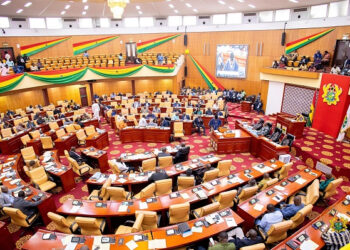Sovereign default is the failure of a government to repay its debt but according to studies, most Governments are usually hesitant to tread on that path, since doing so is likely to bar the country from accessing debt markets again for years.
This is also due to borrowing becoming more expensive, at least for a time when it once again becomes possible.
Meanwhile, the findings of a study on the topic Corruption, Political Dynamics and Sovereign Default Risk indicate that corruption influences Sovereign Default – A Dynamic stochastic general equilibrium (DSGE) says that a more corrupt government will like to default because of the desire to steal money and not pay off its debt.
Sharing with ATL FM NEWS, in an exclusive interview after a Research Seminar on what motivated the study, the lead author of the study who is a Lecturer at the School of Economics, University of Cape Coast, Dr. Adama Adams explained that though a government may decide to default for other reasons, there is a positive relationship between corruption and the risk of defaulting.
He said throughout the study his aim was to find out if it’s possible that corruption can actually influence sovereign default.

Explaining how he started the model, he said “I started using data on sovereign defaults across the world, including Ghana, to look at if that is possible. So empirically, we are able to show that yes there’s a positive relationship between corruption and the risk of defaulting. But as an economist, I also wanted to look at this theoretically. So, I tried to model these variables, and we come up with interesting results.”
“One is that, yes, corruption influences sovereign default. But one interesting result is that if there was a change in regime, if you have two Political parties, changing regime, we said that if the less corrupt government changes to a more corrupt government, the more corrupt government is more likely to default than the reverse.”
The reason according to him is that “if a less corrupt government is in power, a less corrupt government is investment friendly. So, you’re able to borrow more from the international financial markets, so you accumulate more debt. So when the more corrupt government comes to power, they have the chance to steal more of the resources.”
He however notes that every default is strategic as a government may want to default to steal some of the money, or we may know there is the likelihood of defaulting so they can restructure or reschedule their debt.
“And of course, our macroeconomic variables, inflation, interest rates, spreads, all affected by this corruption in the model” he added.
He said the research paper which commenced in 2020 and may be ready by the end of March 2023 will be available for policymakers to refer to it so they can help their respective governments to take concrete steps to manage corruption.
To him, it is important that corruption is reduced since it is impacting positively on the country’s default rate.
“If we could manage corruption, of course, that will go to us managing our fiscal space. If we are able to manage that of course we can avoid all these defaults.”
Considering Ghana’s current debt situation, Dr. Adams says he hopes government does not get to the point of defaulting considering its limitations.
“We defaulted somewhere during the Acheampong regime and we went to the World Bank HIPC in the early 2000s. So since then, we’ve never defaulted outrightly. I know the government is undertaking negotiations with IMF. Whether it’s going to end up defaulting or not, I cannot say now. So let’s wait and see the promise that the IMF has made and whether it would be realized. If cannot be realized, maybe there wouldn’t be an option than to default” he said.
Read also: We will make Elmina the cleanest city in Ghana – Solomon Ebo Appiah
Source: Rosemond Asmah/ATLFMNEWS


























